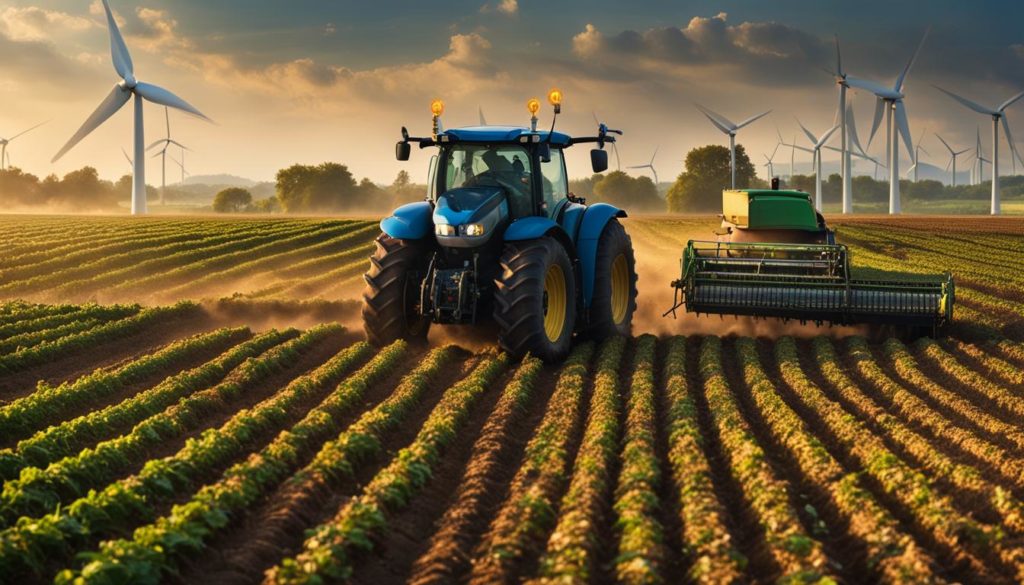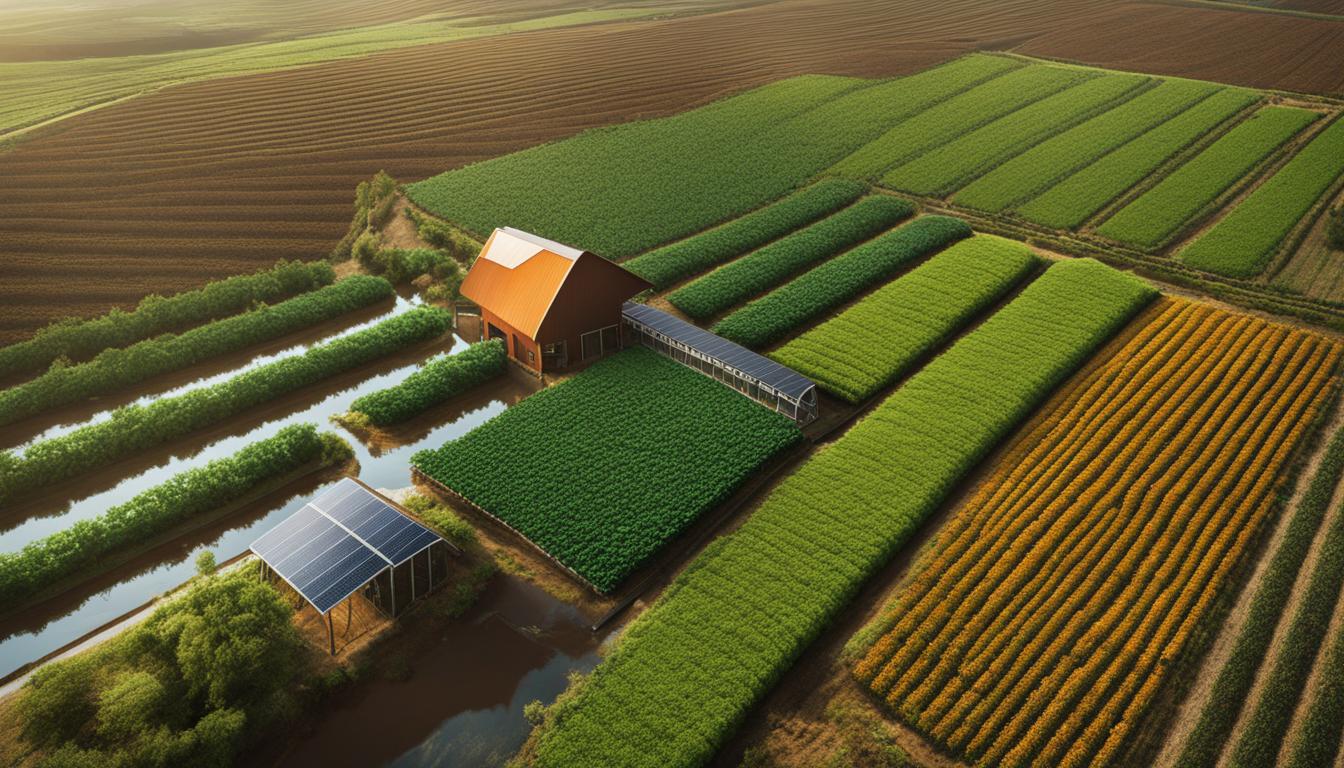Blockchain technology is revolutionizing the agricultural sector by promoting sustainable farming practices and enhancing transparency in the supply chain. As the world recognizes the importance of sustainable agriculture, the adoption of cryptocurrencies and blockchain technology has become increasingly prevalent in the industry. These innovative solutions have the potential to drive positive change and address key challenges faced by farmers and stakeholders.
By leveraging blockchain technology, farmers and stakeholders can track and verify the origins of agricultural products, ensuring that they are ethically sourced and meet sustainability standards. This promotes transparency and consumer trust, as individuals can have confidence in the products they purchase. Furthermore, blockchain enables fair compensation for farmers by eliminating intermediaries and ensuring that payments are made directly and securely.
Financial inclusion is also a crucial aspect of sustainable agriculture. With the integration of cryptocurrencies, farmers in remote areas can access financial services and participate in global markets. This empowers smallholder farmers and promotes economic growth and stability for communities that rely on agriculture.
Overall, the growing adoption of crypto and blockchain technology in sustainable agriculture is driving innovation and transforming the industry. From traceability and transparency to financial inclusion, these technologies have the potential to create a more sustainable, equitable, and efficient agricultural system.
Key Takeaways:
- Crypto adoption in sustainable agriculture is on the rise, leveraging blockchain technology to promote transparency and traceability.
- Blockchain enables fair compensation for farmers and eliminates intermediaries, ensuring direct and secure payments.
- Cryptocurrencies facilitate financial inclusion for smallholder farmers, enabling access to financial services and global markets.
- The integration of blockchain technology in agriculture drives innovation and transforms the industry towards a more sustainable future.
- By promoting sustainable practices and enhancing transparency, blockchain technology fosters consumer trust in the agricultural supply chain.
Advancing the UN Sustainable Development Goals through Blockchain Adoption
Blockchain technology has emerged as a powerful tool to advance the United Nations Sustainable Development Goals (SDGs) in the agricultural sector. By leveraging decentralized finance and cryptocurrency, blockchain is paving the way for sustainable agriculture practices and economic growth. It addresses key challenges related to poverty, hunger, sustainability, and economic inclusivity.
One of the primary areas where blockchain adoption has a significant impact is financial inclusion for smallholder farmers. Many farmers, especially those in remote areas, lack access to traditional banking services. By utilizing blockchain technology and cryptocurrency, farmers can now secure funding and participate in global markets, leveling the playing field and empowering them to make informed decisions.
Another crucial aspect of blockchain adoption in agriculture is promoting transparency and accountability. Blockchain provides a decentralized infrastructure that enhances transparency in financial services, ensuring that individuals without access to traditional banks receive fair compensation. Additionally, blockchain implementation strengthens supply chain verification, enabling the sourcing of ethically produced agricultural products and promoting sustainable production and consumption practices.
Through its decentralized nature, blockchain technology aligns with the goals of responsible consumption, clean water, health, decent work, and climate action. By leveraging blockchain, the agricultural industry can achieve traceability, efficiency, and financial inclusion, ultimately fostering positive change on a global scale.
Advancing the UN SDGs through Blockchain Implementation
| UN SDGs | Blockchain Advantages |
|---|---|
| No Poverty | Financial inclusion for smallholder farmers through blockchain-based financial services. |
| Zero Hunger | Traceability and transparency in the supply chain to ensure food security and fair compensation for farmers. |
| Sustainable Agriculture | Promotion of sustainable farming practices through blockchain-enabled supply chain verification. |
| Decent Work and Economic Growth | Empowering farmers with access to financial services and global markets. |
| Responsible Consumption and Production | Verification of ethically sourced agricultural products through blockchain-based supply chain transparency. |
| Climate Action | Enhancing sustainability in agriculture by promoting efficient resource utilization and reducing carbon footprints. |
Blockchain Platforms Driving Transparency in Agriculture
Blockchain technology is revolutionizing the agricultural industry by promoting transparency, traceability, and efficiency. Several blockchain platforms are leading the way in implementing this technology to address the challenges faced by the industry. Companies like Dimitra and AgriLedger are leveraging blockchain to provide comprehensive solutions for farmers, businesses, and consumers.
These platforms enable the tracking of agricultural products throughout the supply chain, ensuring fair compensation for farmers and promoting sustainable farming practices. By implementing blockchain, these platforms contribute to the overall development and adoption of sustainable farming solutions. With blockchain, farmers and stakeholders can access actionable insights and make informed decisions to improve their productivity and profitability.
Blockchain technology in agriculture is crucial for establishing trust and transparency. By leveraging the decentralized nature of blockchain, these platforms enable farmers, businesses, and consumers to verify the origins and quality of agricultural products. This transparency strengthens the relationship between farmers and consumers, ultimately leading to a more sustainable and accountable supply chain.
| Blockchain Platform | Key Features |
|---|---|
| Dimitra | – Tracks agricultural products throughout the supply chain |
| AgriLedger | – Ensures fair compensation for farmers |
With the implementation of blockchain technology in sustainable farming, the agricultural industry can benefit from increased transparency, traceability, and efficiency. As more platforms emerge, the industry will continue to evolve and adapt to the changing landscape of technology. The future of agriculture lies in the integration of blockchain and other innovative solutions, paving the way for a more sustainable and resilient sector.
References:
“Blockchain technology in agriculture: A systematic literature review.” International Journal of Environmental Research and Public Health
- Blockchain for Agriculture: Digital Transformation Opportunities and Challenges. World Economic Forum.
- Blockchain in Agriculture: A Survey. Sensors (Basel, Switzerland).
Improving Supply Chain Efficiency and Accountability
Blockchain-based supply chain platforms are revolutionizing the agricultural sector by enhancing efficiency and accountability. These platforms utilize blockchain’s immutable nature to verify product certifications, ensuring reliability in claims of sustainability, fair trade, and organic practices. Through decentralized infrastructures, blockchain technology simplifies the tracking and tracing of agricultural products, providing consumers with accurate information about their origins and production methods.
The implementation of blockchain technology in sustainable farming also fosters transparency and trust between farmers, producers, and consumers. By leveraging blockchain’s decentralized ledger, stakeholders can access a transparent and secure network, enabling them to collaborate more effectively. This increased transparency not only ensures fair compensation for farmers but also promotes sustainable agricultural practices that prioritize ethical sourcing and responsible production.
Furthermore, blockchain technology improves supply chain efficiency by streamlining processes and reducing costs. By eliminating the need for intermediaries and manual record-keeping, blockchain platforms facilitate seamless transactions and real-time verification. Farmers, businesses, and consumers can benefit from greater supply chain visibility, ensuring the integrity and authenticity of agricultural products throughout the entire journey from farm to table.
The Potential of Crypto Farming Solutions
Another application of blockchain technology in agriculture is the emergence of crypto farming solutions. These innovative platforms leverage cryptocurrency and smart contracts to enable secure and transparent transactions within the agricultural ecosystem. Farmers can receive immediate and fair compensation for their produce, while consumers can have confidence in the authenticity and quality of the products they purchase.
Crypto farming solutions also offer opportunities for financial inclusivity, particularly for smallholder farmers in remote areas. By utilizing blockchain and cryptocurrency, farmers gain access to financial services that were previously inaccessible to them. These platforms provide a digital infrastructure that empowers farmers to participate in global markets, secure funding, and make secure digital transactions.
In summary, the implementation of blockchain technology in agriculture improves supply chain efficiency and accountability, promotes sustainable practices, and enables financial inclusivity for farmers. These advancements contribute to the overall development and adoption of sustainable farming solutions, aligning with the goals of sustainable agriculture and economic growth.
Digital Transformation in Farming

The digital transformation is revolutionizing the agriculture sector, enabling farmers to leverage advanced technologies like blockchain for sustainable farming practices. By implementing blockchain solutions, smallholder farmers can overcome financial inclusion challenges and access crucial resources to thrive in today’s digital era.
Blockchain implementation in sustainable farming offers numerous benefits, including increased transparency, efficiency, and traceability in the agricultural supply chain. Through blockchain platforms like AgUnity and Kotani Pay, farmers can securely make digital transactions, access vital information, and participate in global markets. These user-friendly interfaces empower smallholder farmers to emancipate themselves from traditional barriers and explore new opportunities.
Blockchain technology provides smallholder farmers in remote areas with the tools to access financial services, secure funding, and compete on a global scale. It bridges the gap between conventional farming practices and the digital future, offering a level playing field for all farmers.
Moreover, blockchain implementation in sustainable farming promotes financial inclusion by enabling fair compensation and access to financial services. Through this decentralized technology, smallholder farmers can receive fair prices for their products, eliminating intermediaries and ensuring equitable trade. The transparent nature of blockchain also instills trust between farmers, consumers, and other stakeholders in the supply chain.
Table: Benefits of Blockchain Implementation in Sustainable Farming
| Benefit | Description |
|---|---|
| Financial Inclusion | Enables smallholder farmers to access financial services and secure funding for agricultural activities. |
| Transparency | Enhances transparency in the agricultural supply chain, ensuring fair compensation and ethical practices. |
| Efficiency | Streamlines processes and reduces inefficiencies in the agriculture sector, improving productivity and profitability. |
| Traceability | Enables the tracking and verification of agricultural products from farm to table, ensuring quality and safety. |
By embracing digital transformation in farming through blockchain implementation, smallholder farmers can overcome financial barriers, access new opportunities, and contribute to a more sustainable and inclusive agricultural industry.
Conclusion
Blockchain technology is revolutionizing the agricultural industry, driving sustainable practices, transparency, and financial inclusion. By leveraging the power of blockchain, farmers and stakeholders can track and verify the origins of agricultural products, ensuring fair compensation while increasing efficiency in the supply chain. The adoption of blockchain in sustainable agriculture aligns closely with the United Nations Sustainable Development Goals, fostering positive change worldwide.
With blockchain, the agricultural sector is becoming more resilient, equitable, and environmentally sustainable. The implementation of blockchain technology enables farmers to promote sustainable farming practices, ensuring the ethical sourcing of products. By verifying claims of sustainability, fair trade, and organic practices, blockchain enhances supply chain transparency, instilling trust among farmers, producers, and consumers.
In addition to its impact on sustainability, blockchain technology also plays a crucial role in improving financial inclusion for smallholder farmers. Through the use of blockchain and cryptocurrency, farmers gain access to important financial services, secure funding, and participate in global markets. Platforms like AgUnity and Kotani Pay provide user-friendly interfaces, allowing farmers to make secure digital transactions and access valuable information for informed decision-making.
As the role of blockchain in agriculture continues to grow, the industry is poised for further advancements. The adoption of blockchain technology offers immense potential, from promoting sustainable practices to enhancing transparency and financial inclusion. With ongoing innovation and implementation, the agricultural industry can embrace a more resilient, equitable, and environmentally conscious future.
Source Links
- https://cointelegraph.com/news/the-role-of-blockchain-in-agriculture-and-how-it-advances-the-uns-sustainable-development-goals
- https://www.cryptoaltruism.org/blog/three-ways-blockchain-and-crypto-will-lead-to-a-more-sustainable-and-equitable-agricultural-sector
- https://www.linkedin.com/pulse/blockchain-revolutionizes-agriculture-boosting-efficiency-6rcjc
- Customer Engagement and Loyalty: Innovating the Future of Saudi Arabia’s Dedicated Cargo Airline - December 23, 2024
- Regulatory and Compliance: Pioneering the Future of Saudi Arabia’s Dedicated Cargo Airline - December 21, 2024
- Financial Strategies: Fueling the Growth of Saudi Arabia’s Dedicated Cargo Airline - December 20, 2024






